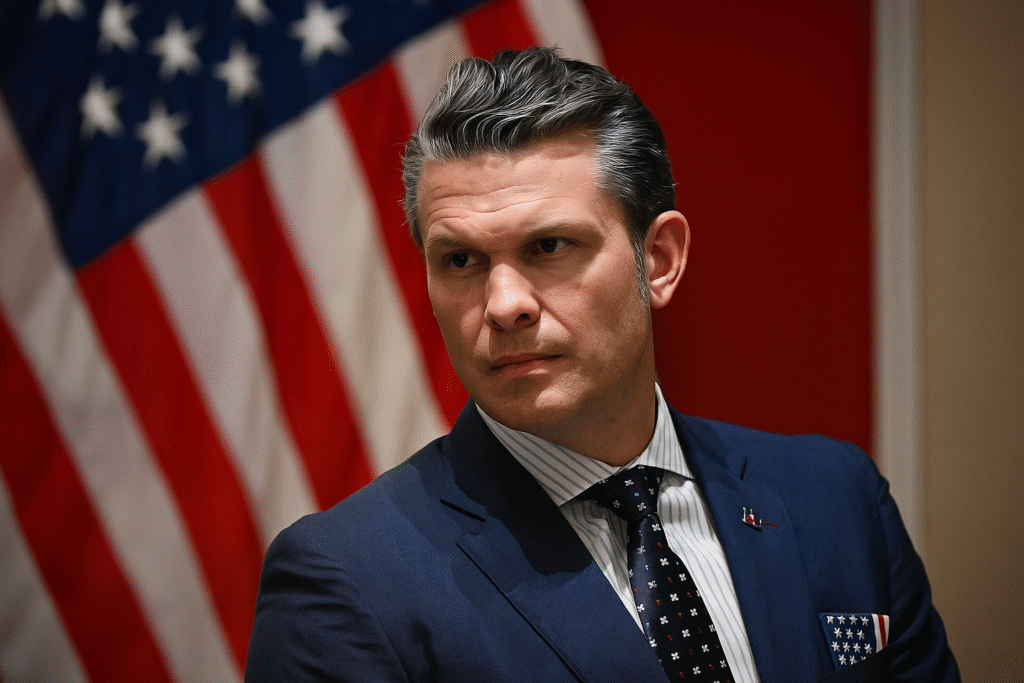By Harshit, September 30, 2025 | Washington, D.C. | 10:30 AM EDT
US Defense Secretary Pete Hegseth delivered a fiery address to America’s top generals and admirals this week, announcing a sweeping overhaul of military culture and policy. In a speech marked by sharp rhetoric and sweeping declarations, Hegseth unveiled ten directives designed to shift the Pentagon away from what he called the “woke department” and toward a culture centered on merit, discipline, and warfighting readiness.
The unusual assembly of flag officers in one place underscored the gravity of the moment. Rather than distribute a memo or record a briefing, Hegseth opted for a confrontational, politically charged speech aimed at reshaping both internal military culture and the broader public perception of the armed forces.
“Woke Department” and Diversity Backlash
Hegseth criticized what he described as an overemphasis on diversity, equity, and inclusion (DEI) initiatives within the military, calling them a distraction from core combat readiness.
“First of all, you’ve got to fire the chairman of the joint chiefs,” he said in reference to CQ Brown, whom he dismissed earlier this year. “Any general, admiral, or whatever that was involved in any of that DEI woke shit has got to go.”
While the military does not use racial quotas for promotions, it has long sought to reduce discrimination and ensure equal opportunity across ranks. Hegseth, however, announced a review of promotions to strip away what he described as hidden quotas.
“Colorblind, gender-neutral, merit-based; the entire promotion process, including evaluations of warfighting capabilities, is being thoroughly re-examined,” he declared.
Overhauling Oversight and Complaints
Another of Hegseth’s priorities is reforming how complaints are handled. He promised changes to inspector general and equal opportunity procedures, aiming to reduce what he called “frivolous complaints” that derail careers.
“I call it the no more walking on eggshells policy,” he said. “No more frivolous complaints … no more side-tracking careers.”
Additionally, Hegseth pledged to establish a process to remove “forgivable earnest or minor infractions” from leaders’ records, giving commanders more latitude in decision-making.
Fitness, Standards, and Discipline
A major component of Hegseth’s directives involves restoring traditional military standards. He ordered a return to the physical and appearance benchmarks of the 1990s, including rescinding beard waivers—known as shaving profiles—for all but special forces.
“War does not care if you are a man or a woman,” he said, insisting that female soldiers in combat roles must meet the same physical requirements as their male counterparts.
Drill sergeants, he announced, will be empowered to revive harsher training methods such as “shark attack” exercises, where multiple instructors aggressively confront a recruit. Basic training, he said, should be “scary, tough, and disciplined,” designed to instill fear and resilience in new soldiers.
Rules of Engagement and Battlefield Authority
Perhaps most controversially, Hegseth vowed to review and loosen the military’s rules of engagement. “We untie the hands of our war fighters to intimidate, demoralize, hunt, and kill the enemies of our country,” he said. “No more politically correct and overbearing rules of engagement. Just common sense, maximum lethality, and authority for war fighters.”
This shift coincides with a broader restructuring of military legal oversight. Hegseth removed or reassigned numerous military lawyers who had advised commanders on the legality of operations. He then installed his personal attorney, former naval officer Tim Parlatore, as a Navy commander to oversee legal guidance with an emphasis on granting commanders more leeway in battlefield decisions.
A Political Speech as Much as a Military One
Throughout his remarks, Hegseth interspersed his directives with political commentary and combative slogans. Taking aim at critics, he said, “Should our enemies choose foolishly to challenge us, they will be crushed by the violence, precision, and ferocity of the war department. To our enemies: FAFO”—an acronym for “f*** around and find out.”
Theatrical and incendiary in tone, the address seemed designed not only to galvanize military leaders but also to project strength to political allies and adversaries alike. His criticism of former top officials such as Gen. Mark Milley underscored a deliberate break with past Pentagon leadership.
Fallout and Uncertain Future
Hegseth’s early tenure has already been marked by the dismissal of numerous senior officers, many of them women or Black leaders. Critics argue this pattern undermines diversity and morale, while supporters claim it restores accountability and prioritizes warfighting over politics.
What remains unclear is how the sweeping directives will affect the armed forces’ operational readiness, internal cohesion, and international reputation. With Pentagon leadership in flux and policy changes rolling out rapidly, Hegseth’s push to redefine the “war department” signals a dramatic cultural shift at one of the world’s most powerful institutions.

